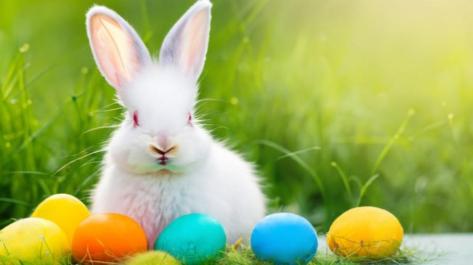The Easter Bunny - Where did it come from?

I once had a pet rabbit who lived in the house same as my two dogs and cat. It was a house full of animals (and a little chaos)! He was house broke, used a litter pan, just like my cat, and was one of the most intriguing pets I’ve ever had. He was a large black and white French Lop rabbit named Bandit. The dogs were terrified of him because he was much larger than they were when I first brought them home as puppies. This was comical considering they were Basset Hounds and Basset Hounds were originally bred to hunt rabbits. Bandit’s best friend was the cat. They played together and chased each other around the house. I think Bandit actually thought he was a cat. Bandit got his name from the black fur around his eyes which looked like he was wearing a mask. His name also fit him as he could be a bit of a “bandit” if I didn’t keep an eye on him when I would give him the run of the house outside of his kennel. He especially liked to chew through electric cords, phone cords, computer wires, etc. if I wasn’t paying attention. Cords and his own toys was all he ever destroyed in the house however, and he always, faithfully, used his litter pan. He would go for walks on a leash outside with me and he had the largest personality. He was fun and cute as could be, but he was no Easter Bunny. He had an attitude and would snort when mad. Although Bandit was definitely no Easter Bunny I’ve often wondered where the Easter Bunny originated.
As a child I remember the Easter Bunny as a 6-foot rabbit, wearing human clothes, who snuck around the yard the night before Easter and hid colored eggs that it “laid”. Hmm…I have questions. Where did this whole magical idea of the Easter Bunny originate? Why does he bring us candy and eggs? A rabbit that “lays” eggs? And most importantly, what does a bunny have to do with the religious holiday of Easter?
Easter is a time to celebrate the end of the Lenten season and the resurrection of Jesus. The Bible makes no mention of a mythical hare who delivers eggs to children on the day of Jesus’ resurrection. So how has a rabbit become a prominent piece of one of Christianity’s most important celebrations? After doing a little research on the topic, I discovered there are a lot of theories out there. One stems from an ancient pagan tradition called the festival of Eostre, which honored the goddess of fertility, spring and new beginnings. This ancient goddess of spring found a bird with an injured wing. She knew it wouldn't fly again even if she healed it. Instead, she transformed it into a hare but it retained its ability to lay an egg. To thank her, the hare lays a colored egg for her every spring on her festival day. The rabbit became the spirit animal of the goddess of fertility, spring and new beginnings.
Eggs have long been considered an ancient symbol of rebirth and new life. Possibly representing Jesus’ resurrection and emergence from the tomb. A theory which dates back to the 13th century when eggs were considered a forbidden food during the Lent season, is that people would decorate them as the fasting period came to an end to make eating them a more celebratory way to feast on Easter Sunday.
Eggs have been a symbol of spring rebirth since ancient times. Engraved ostrich eggs were discovered in Africa dating from 60,000 years ago; decorated eggs were commonly placed in the graves of ancient Egyptians 5,000 years ago, early Christians of Mesopotamia dyed eggs red to represent the blood of Christ.
The two symbols of fertility, the egg and the hare, come together in an ancient German tradition of a mythical hare that laid colored eggs for children to find on Easter Day. This was introduced to America by German immigrants in the 18th century with the tradition of an egg-laying hare name “Osterhase” (hase means hare in German). Children would make nests where the bunny could leave his eggs and even sometimes set out carrots for him in case he got hungry. Remind you of any other holiday tradition? Such as Santa?
While Bandit, the house rabbit, was a beloved member of my family, I’m certain he would not have enjoyed the celebrity status of being the Easter Bunny. Not every bunny can be an Easter Bunny. It appears that throughout history the Easter Bunny was a very special rabbit indeed, but just like Santa and Christmas there is no confirmed religious origin to the Easter Bunny’s association with Easter Sunday. Regardless of how it came to be, this beloved magical character remains a fun tradition bringing joy to children and families each year as we celebrate the Resurrection of Jesus. - Sandy Vesledahl, Office Administrator
